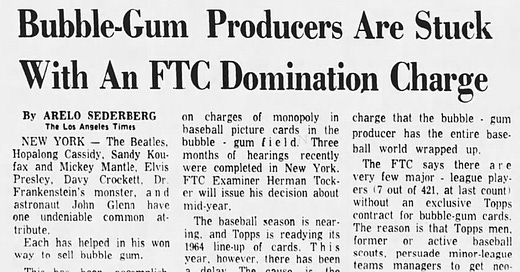When Fleer Fought Topps
You’re not going to get far in researching the history of baseball card references in the media without coming across articles like this:
It’s actually not difficult to figure out what happened here.
To win its full out war against Bowman, Topps started signing players to exclusive bubble gum card contracts. Bowman wound up losing the famous baseball card wars of the early 1950s because Topps snatched up the biggest names, and Topps wound up with an effective monopoly over the bubble gum card industry.
Fleer, a company poised to compete directly with Topps, first complained to the FTC in 1962:
I’m not certain that collecting baseball cards truly is a “boon to physical fitness.” My guess is that the average American card collector today is probably considerably more rotund (and older) than the average collector was in 1962.
At any rate, Larry Merchant unfortunately doesn’t focus his writing at the heart of the issue, which is whether Topps indeed had a monopoly on the industry. This is probably because the answer to that question was obvious.
As the FTC’s investigation continued, articles on the monopoly started to creep forward:
And then came this Arelo Sederberg article, which was one of the most detailed looks into the industry I’ve been able to find:
Now, we do know the end from the beginning in this case. The FTC ruled in 1964 that Topps indeed had a monopoly. In fact, the extensive report is a long but fascinating read for the would-be baseball card historian.
But that didn’t end the monopoly. As detailed in this excellent Library of Congress blog entry, the FTC backed down on appeal, ruling that Topps didn’t actually own a monopoly on the sale of all baseball cards. Other companies could compete by selling cards packaged together with non-gum items.
It wasn’t until 1980 that the Topps monopoly was finally broken up — coinciding, of course, with the beginning of the Junk Wax era.
Of course, there’s historical irony in all of this. Topps has yet another monopoly, as it has been the only baseball card company officially licensed by Major League Baseball since 2009. As is well known, the company now belongs to Fanatics, which has succeeded in establishing monopolistic control over trading cards in all sports. It turns out that granting rights tends to lead directly to the creation of monopolies.
We’ll see how long it lasts. Unless the industry starts attracting younger collectors again, though, I doubt many companies will bother trying to fight against Fanatics. And, sadly, the days of buying a package of 5 cards and some bubble gum with your allowance are long gone.











I don't know if Larry Merchant was trying to be clever, but the company was never known as Fleers. Also, the Chicago owner was Phil Wrigley, not Wiggily 🙄